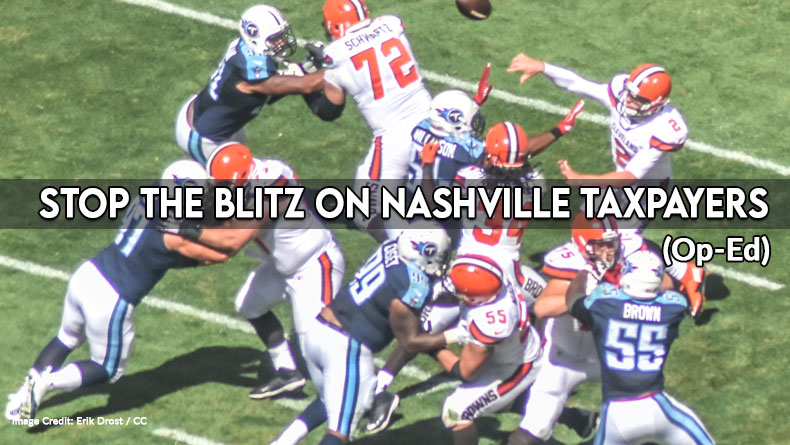How economic principles can help tackle the broken system of stadium funding.
Image Credit: Erik Drost / CC
By Steven Sprick Schuster | Jones College of Business via The Center Square –
Public approval for the massive bill for the Tennessee Titans’ new stadium development is likely to occur later this week.
Despite polls showing opposition from residents and nearly universal condemnation from experts who argue that taxpayer-funded stadiums are a poor use of public money, the approval of what will be the largest taxpayer-funded stadium in NFL history has long felt inevitable.

But of course, the reason that the stadium will likely be approved with minimal pushback is not because it’s a good idea, but because the alternative is even worse, at least for the relevant decision-makers. If we don’t pay the owners of the Titans more than a billion dollars, they will move the team. It’s a credible threat: look no further than St. Louis, Oakland, and San Diego to see cities that lost their teams to new stadiums in new cities.
Lawmakers want to keep the Titans in town, even if meeting the team’s demands is a bitter pill.
But this dynamic is unique in American business and global sports. When Premier League teams need new stadiums, they fund them primarily through private funds. When Publix wants to open a new store, it doesn’t go to Metro Council asking for money under the implicit threat of leaving town.
What makes American sports stadiums different?
The answer is that we have given sports leagues this bargaining power. While the NFL is subject to anti-trust laws in many ways, it can engage in many activities that mimic that of a cartel, allowing teams to coordinate in ways that would violate existing laws protecting consumers from businesses engaging in anti-competitive behavior. Some of this is necessary, allowing leagues to negotiate labor agreements and television contracts collectively. It also allows leagues to fiercely protect themselves from entrants, a power they exert by limiting the number of teams.
Imagine if other businesses were given so much power in limiting competition.
What if a new bar on Broadway could only open if three-fourths of the existing bars approved of it? The result, predictably, is that the demand for sports teams massively outstrips the supply.
In a competitive market with free entry, Nashville would have no incentive to give up more than a billion dollars to keep a team in town. If that team left, so be it. The city is big enough to support an NFL team, so if one team left, another would arrive, or a new one would be created. Of course, in such a setting, the team would never leave since no other city would be willing to offer those same handouts.
Obviously, the unique structure of sports leagues makes some protection from anti-trust legislation necessary. But the current structure allows team owners to create artificial scarcity, which further drives up the value of teams to the benefit of owners while also allowing teams to negotiate with the home cities under that not-so-subtle threat of leaving. It creates an upside-down world where customers compete over businesses instead of businesses competing over customers.
There are many potential solutions to this problem, some more radical than others. We could simply pass legislation that states that leagues can continue to enjoy the anti-trust protections they currently have under the condition that any stadium funding can only be approved via bond election. This would prevent situations where city councils approve funding measures the voters dislike.
Or we could allow for more competition within the NFL, lowering the barriers to entry for new teams. After all, if a team can be profitable in Buffalo, N.Y. – the 50th largest U.S. metro area – it can be profitable in Portland, Austin, or Columbus. The existing owners wouldn’t like this, because more competition would mean that they would have to constantly improve their product to keep customers happy. You know, the way all other businesses operate. But their loss would be our much, much bigger gain.
This idea may sound strange, given the status quo, but the economic benefits are clear. More teams would mean more jobs for players and team and stadium employees.
And the consumer benefits are just as clear. If you love the sensory overload of flipping between nine simultaneous games on Sunday afternoon, imagine 12 or 13. Or the ease with which you could follow the Titans to road games in Memphis, Louisville or Oklahoma City.
Stadium funding is a broken system where taxpayers, rich and poor, provide massive tax breaks for billionaires. I don’t blame the owners. They are using a favorable setting to squeeze every dollar they can from the products they are offering.
But the playing field isn’t level.
We can level it by increasing the competition that teams face. After all, aren’t sports all about the spirit of competition?

About the Author: Steven Sprick Schuster is an assistant professor of economics in MTSU’s Jones College of Business and a faculty member of the Political Economy Research Institute.




2 Responses
So this article is in favor of a stadium that most taxpayers oppose?
I would JUST say NO!!! But he says >”If we don’t pay the owners of the Titans more than a billion dollars, they will move the team.” LET them move!!! With your attitude Nashville’s lucky the Titans don’t want $5 Billion.
Nashville’s property taxes are already 40% more than Williamson County – this is an example of why.
Nashville KEEP voting these Liberals in and nothing will ever change no matter how much you don’t want something. Too much money and kickbacks involved for CORRUPT politician’s and others.